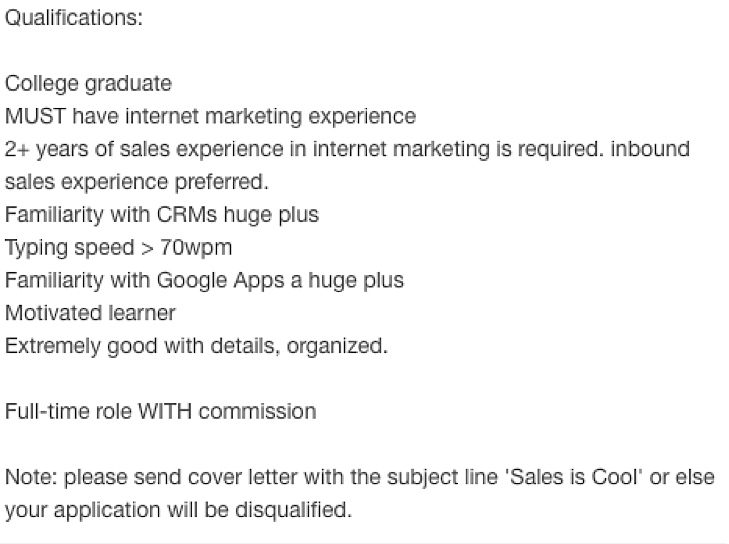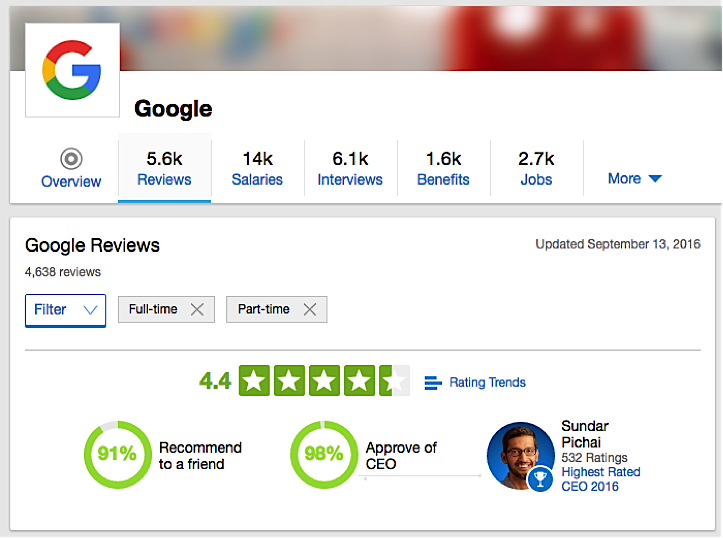If you run a business, you know how difficult it is to recruit the right candidates.
Whenever you post a job on a job board, it’s easy to get a massive influx of applicants — but over 90% of them are usually unqualified.
And even the qualified candidates might not be the best fit for your business. In fact, studies show that 46% of new hires will fail within the first 18 months on the job for a variety of reasons, the main ones being:
- Inability to accept feedback
- Unable to understand and manage emotions
- Lack the necessary motivation to excel
- Have the wrong temperament for the job
- Lack of technical skills
The cost of a bad hire isn’t something you want to deal with — especially if you run a small company with a small budget. Apart from the money spent to hire the employee initially, you’ll also have to deal with decreased morale from other employees, decreased productivity across the board, and spend even more valuable time and money hiring someone all over again.
That’s why your interview process is probably the most important component of your hiring funnel.
By structuring your interviews the right way and asking the right questions, you can dramatically decrease your chances of hiring someone who will cause headaches for your company very quickly down the road.
In this post, we’ll go through how to conduct effective interviews so you can easily identify the best hires.
The Interview Process
Filtering Candidates
The first step of any interview process is selecting the right candidates to talk to. You need to screen your applicant pool for the ones who are qualified and serious about working for your company.
One of the best ways to figure out if a candidate is serious or not is by seeing how closely they research your company or read the job description you posted. Many applicants will blast resumes and cover letters out to a hundred different companies without even reading what they’re applying for.
It’s important to find and filter out those applicants.
By adding a layer in the first step of your hiring process that requires a candidate to follow a specific direction or complete a certain task, you can quickly separate the qualified, serious candidates from the rest. This way, you won’t waste additional time looking through applications that aren’t a good fit.
For example, here’s one part of a job description we posted for a sales rep position:

At the end of the job description (below the responsibilities and qualifications), we included a note that asked candidates to submit a cover letter with the subject line “Sales is Cool.” Those who didn’t follow this instruction were immediately disqualified. Why? Because they either didn’t read the description at all when mass-applying for positions, or they did read this line but don’t follow directions very well.
By doing a little trick like this, you can focus on the applications you get from the top 10% of people who are paying close attention to your job description.
Read More: How To Cut Through 92.4% Of Unqualified Candidates When Hiring Talent
Once you have a list of the desirable candidates, you can proceed to scheduling them for a first-round interview.
Scheduling Candidates
There are a few things to keep in mind when scheduling candidates for interviews:
- Value the candidate’s time. If you show up late to an interview or don’t communicate properly about interview schedules with candidates, you’re sending the message that their time isn’t as important as yours. Though some candidates may put up with this, high-quality candidates will screen you just as much as you screen them. It’s important to start off on the right foot by staying organized and on time throughout the process.
- Use scheduling tools. One way to make your interview process more efficient is by using scheduling tools.
Scheduling can be a big hassle, especially if you’re interviewing multiple candidates and are trying to coordinate between many different time slots. By using a tool like Calendly, you can automate the booking process without having to go back and forth via e-mail with each candidate trying to find an appropriate time. Both you and your candidates will also automatically get a Google calendar invite so you don’t have to manually enter anything into your calendar.
Choosing Your Interview Structure
Depending on the type of candidate you’re hiring and what you’re looking for, you’ll want to choose between a few different interview structures. For example, if you’re hiring a remote worker, you might ask situational interview questions to see how they would structure their day if they were working on their own.
Learn More: How to Hire A-Player Remote Workers (and Keep Them Happy)
Before we get into the different interview types and some sample questions you can ask, let’s start with the overall process for running an interview:
- Base questions on the key competencies needed for the job. Before you interview candidates, it’s important that you have a clear picture of the skills or personal qualities you want to assess. Knowing this gives you a good sense of what questions to ask in your interviews to determine technical skill and culture fit.
Examples of these key competencies might include things like: being able to work well with others, being action-oriented, always learning, or being able to manage themselves.
- Develop behavioral-based questions in advance. Behavioral questions are those related to how a candidate performed in a particular situation in the past. Studies show that past performance is the best measure of future performance, so it’s useful to understand how candidates performed in the past, what challenges they’ve faced, and the results they produced.
Here’s an example of a behavioral interview question: “Tell me about a specific time when you had to deal with a difficult customer complaint. Describe your actions. What was the outcome?”
- Develop a rating scale to evaluate candidates. When you’re doing a lot of interviews at once, it’s easy for all of them to blend together until you can’t remember the difference between candidates. This might result in hiring the wrong person.
By creating a rating scale for each candidate, you can compare them all side by side and choose the best one for your company. Your rating scale could be as simple as a 5-point scale to evaluate each candidate on each quality that you want to measure.
- Determine the format of the interview. Typically, companies invite candidates to a phone or video interview first to save both parties time. If that goes well, they’re advanced to either a second-round interview or a technical skill challenge. From there, depending on how big the company is and how many other people the candidate would be working with, they’re usually pushed to a final-round interview before any offer is made.
Many companies start candidates off by interviewing with more junior managers and end with a final-round interview with a senior executive or the CEO. But keep in mind that A-players don’t want to work with B or C players. This is why it can help your business if the CEO or a senior executive screens candidates first and only presents the best ones to the team. This way, the team knows that their time is valued and respected, and they’ll feel energized knowing that the company is attracting a wide range of other A-players.
- Train your interviewers. It’s important to make sure that all interviewers are on the same page when it comes to your interview process. For example, make sure that they’re all using the same rating scale to evaluate candidates on a set of qualities, that they’re asking the same type of questions, etc.
Now, let’s talk a bit about different types of interview questions you might want to ask candidates.
Types of Interview Questions
The first type of interview questions are general personal overview questions. These are questions like:
- What part of your resume are you most proud of?
- What are your personal goals?
- What gets you up in the morning? What’s your biggest motivator?
- What’s your educational background?
These questions give you a better sense of who the candidate is as a person, and it also gives you specific material to verify when you do your reference checks.
You should also ask questions to determine a candidate’s motivations for applying for a position at your company. Ask them things like:
- Why did you leave your last job?
- How would you describe your previous co-workers?
- Where do you see yourself in five years?
- What made you get into [insert profession]?
- Tell me a bit about yourself.
You also want to look for candidates that screen you, not just candidates who want the first job offer they can get. A-players always have more than one option to choose from, and they know it — so they’ll be sure to do their homework on you.
To assess this, you can ask questions like:
- What is it about our company that excites you the most?
- Why are you interested in working for us?
- What do you think you could bring to the table for our business?
If you’re looking to hire A-players, especially if you run a smaller company, then chances are you’re looking for someone who isn’t afraid to take initiative and wear multiple hats. You want someone who has a “bias towards action,” and does whatever is necessary to get the job done.
You can assess this through a series of behavioral questions, like:
- Can you tell me about a time when you did something impressive? Why did you consider that impressive?
- What’s an example of a time when you’ve taken initiative?
- What’s the most difficult group you’ve had to lead? How did you make that team successful?
Read More: 150 Sample Interview Questions for Every Startup
Cover Your Bases Legally
When interviewing candidates, there are certain legal issues that you should watch out for so that you don’t get yourself or your company into trouble.
For example, one of the things you should never ask about is a candidate’s age. The only requirement when it comes to age is that the candidate is old enough to legally be able to work. Any further questioning about the specific age of a candidate is illegal.
Here are some other things you should never ask about in an interview:
- A candidate’s nationality
- If they’re planning on having children
- Marital status
- Prior illnesses
- Financial obligations
- How long they plan on working
Follow Up
Following up with candidates after they interview with your company is not only the respectful thing to do, it also helps your brand.
One of the most visited sites by candidates in the recruiting process is Glassdoor. On this site, candidates can see reviews from other employees, as well as reviews from other candidates talking about their interview experience.

Following up after interviews will immediately set you apart from other companies, help you build a better brand, and earn more respect in the online world. Having positive reviews also helps attract more top talent to your business.
Conclusion
Conducting proper and thorough interviews is the best way to make sure that you hire top-performers who can help take your business to the next level, and avoid applicants who send out mass resumes.
Ensure that you screen candidates effectively by making them jump through a hoop, choose the right type of questions to ask, having an efficient method to scheduling interviews, maintain a consistent rating scale — and you’ll attract more of the right type of talent with less effort.
What will you change about how you interview and hire candidates? Leave your answers in the comments below!


